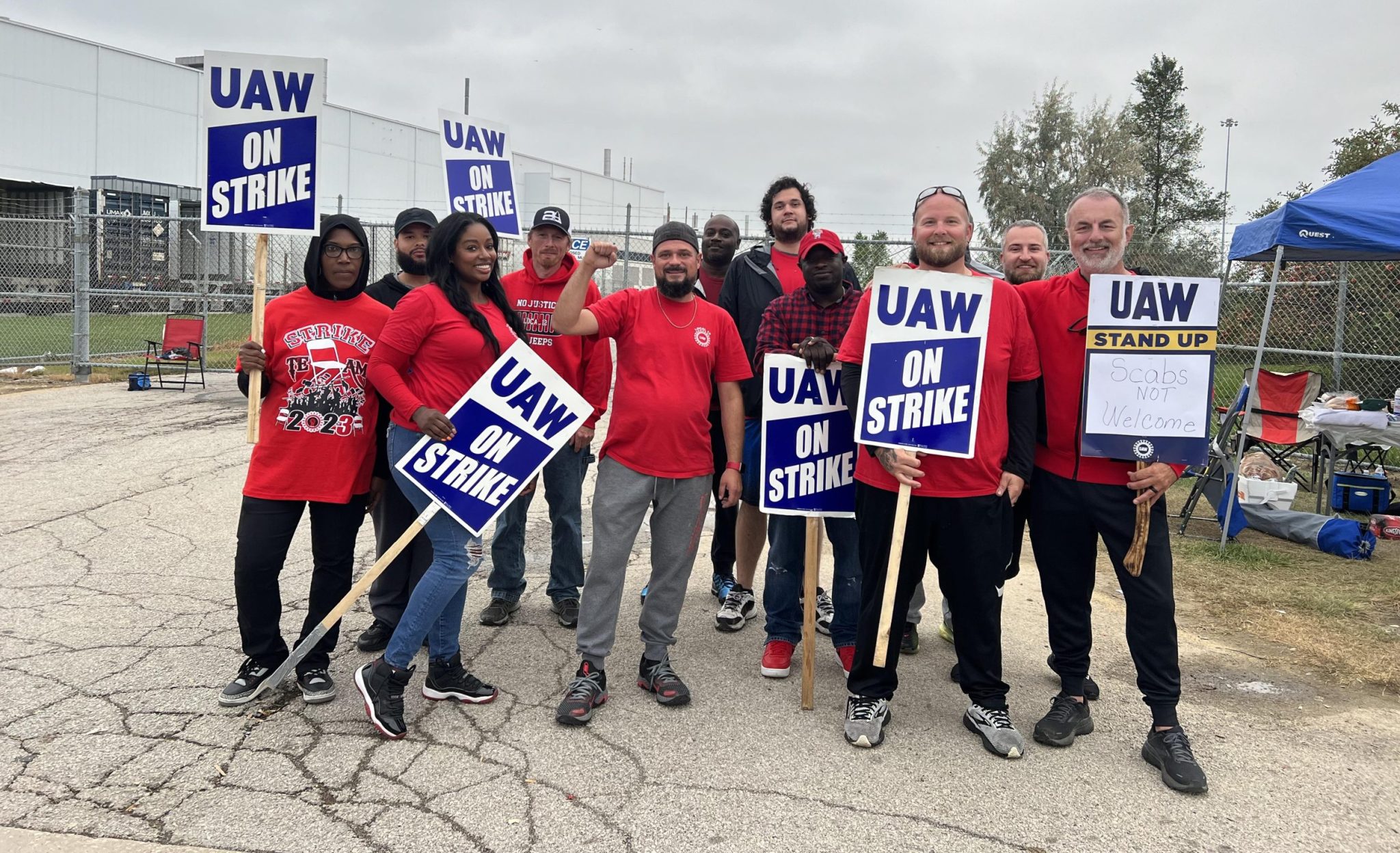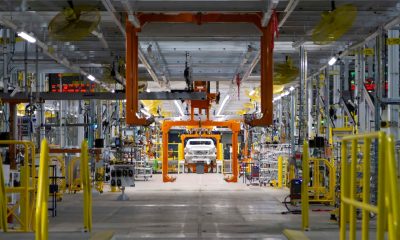On Friday, the United Auto Workers (UAW) union entered its 15th day on strike, accompanied by additional walkouts of General Motors (GM) Ford plants. Stellantis, the parent company of Chrysler, Dodge Ram and Jeep, managed to avoid heightened strikes after reportedly making some progress on contract negotiations.
After the UAW said last week that it would escalate strikes if progress wasn’t made on new contracts, the union officially ordered workers to walk off the job at two assembly plants on Friday: one run by Ford in Chicago, Illinois and another run by Stellantis in Lansing, Michigan, Reuters reports. Stellantis avoided the escalated strikes after UAW President Shawn Fain said the automaker made some last-minute concessions.
The news brings the total number of striking workers up to about 25,000, with the historic strike now in its third week. This is the first time in history that auto strikes have targeted all three of the automakers at once, with the UAW strategically striking at key facilities to disrupt supply chains and force negotiation.
The additional walkouts also mark the second Friday on which additional UAW workers vacated their work sites, with employees walking out of 38 more GM and Stellantis facilities on September 22.
Following the updated walkouts on Friday night, Ford CEO Jim Farley and GM CEO Mary Barra laid into the UAW.
“It’s clear that there is no real intent to get to an agreement,” Barra said.
Yahoo Finance reported on Friday that Farley said the UAW was holding an agreement “hostage” over battery plants, adding that the union’s demands “could have a devastating impact on our business.”
Farley recently also stated that the union’s demands would bankrupt Ford if enacted. Tesla CEO Elon Musk reiterated a similar point this week, saying a 32-hour work week combined with a 40-percent wage hike would be a “sure way” to make the three automakers go bankrupt.
“I need to be clear about one thing, because the UAW is scaring our workers by repeating something that is factually not true, none of our workers today are going to lose their jobs due to our battery plants during this contract period or even beyond this contract,” Farley said. “In fact, for the foreseeable future, we will have to hire more workers as some workers retire in order to keep up with the demand of our incredible new vehicles.”
The union responded that neither Farley nor Barra showed up to bargaining this week.
“We want to get agreements,” Fain said on Friday outside the Lansing GM plant. “We have been there every day 24/7 since the middle of July, we have been there every day. It’s ironic that some of these CEOs make these statements and literally the CEO of Ford has been in probably three meetings over the course of these nine or 10 weeks.”
President Biden backs UAW’s demand for a 40-percent pay raise
Ford Supply Chain Officer Liz Door said that if strikes continued, we could see as many as 300,000 to 500,000 employees laid off across the auto industry, especially in auto supply positions. Farley said that the 125,000 jobs held by Ford suppliers would also be put “at risk” without a deal.
In a separate report, Reuters also noted that the UAW dropped charges previously filed against GM and Stellantis with the National Labor Relations Board (NLRB), which alleged unfair labor practices at the two companies and claimed that the companies weren’t bargaining in good faith.
The UAW represents about 150,000 workers at the three auto companies, and the current strikes make up about 17 percent of the total figure. The UAW is demanding the following in updated union contracts:
- 40-percent wage hikes over four years
- 32-hour work weeks
- Eliminating tiered wage systems requiring several years to reach top wages
- Restoring traditional pension plans
- Restoring wage cost-of-living-adjustments (COLA)
- Improved vacation, retirement and family leave
The automakers have offered wage increases of about 20 percent in contracts over the four years, though negotiations reportedly remain far apart.
Some expect the situation to positively affect non-unionized electric vehicle (EV) maker Tesla, though others point out that the strikes are likely to make wages — and subsequently car prices — increase alongside those of the three legacy automakers. Among the topics regularly discussed during negotiations is the fact that EVs have fewer parts than gas cars and thus will require fewer workers in the future.
Trump claims electric vehicle shift will kill jobs, so UAW talks don’t matter
What are your thoughts? Let me know at zach@teslarati.com, find me on X at @zacharyvisconti, or send your tips to us at tips@teslarati.com.
Elon Musk
Tesla investors will be shocked by Jim Cramer’s latest assessment
Jim Cramer is now speaking positively about Tesla, especially in terms of its Robotaxi performance and its perception as a company.

Tesla investors will be shocked by analyst Jim Cramer’s latest assessment of the company.
When it comes to Tesla analysts, many of them are consistent. The bulls usually stay the bulls, and the bears usually stay the bears. The notable analysts on each side are Dan Ives and Adam Jonas for the bulls, and Gordon Johnson for the bears.
Jim Cramer is one analyst who does not necessarily fit this mold. Cramer, who hosts CNBC’s Mad Money, has switched his opinion on Tesla stock (NASDAQ: TSLA) many times.
He has been bullish, like he was when he said the stock was a “sleeping giant” two years ago, and he has been bearish, like he was when he said there was “nothing magnificent” about the company just a few months ago.
Now, he is back to being a bull.
Cramer’s comments were related to two key points: how NVIDIA CEO Jensen Huang describes Tesla after working closely with the Company through their transactions, and how it is not a car company, as well as the recent launch of the Robotaxi fleet.
Jensen Huang’s Tesla Narrative
Cramer says that the narrative on quarterly and annual deliveries is overblown, and those who continue to worry about Tesla’s performance on that metric are misled.
“It’s not a car company,” he said.
He went on to say that people like Huang speak highly of Tesla, and that should be enough to deter any true skepticism:
“I believe what Musk says cause Musk is working with Jensen and Jensen’s telling me what’s happening on the other side is pretty amazing.”
Tesla self-driving development gets huge compliment from NVIDIA CEO
Robotaxi Launch
Many media outlets are being extremely negative regarding the early rollout of Tesla’s Robotaxi platform in Austin, Texas.
There have been a handful of small issues, but nothing significant. Cramer says that humans make mistakes in vehicles too, yet, when Tesla’s test phase of the Robotaxi does it, it’s front page news and needs to be magnified.
He said:
“Look, I mean, drivers make mistakes all the time. Why should we hold Tesla to a standard where there can be no mistakes?”
It’s refreshing to hear Cramer speak logically about the Robotaxi fleet, as Tesla has taken every measure to ensure there are no mishaps. There are safety monitors in the passenger seat, and the area of travel is limited, confined to a small number of people.
Tesla is still improving and hopes to remove teleoperators and safety monitors slowly, as CEO Elon Musk said more freedom could be granted within one or two months.
News
Tesla launches ultra-fast V4 Superchargers in China for the first time
Tesla has V4 Superchargers rolling out in China for the first time.

Tesla already has nearly 12,000 Supercharger piles across mainland China. However, the company just initiated the rollout of the ultra-fast V4 Superchargers in China for the first time, bringing its quick-charging piles to the country for the first time since their launch last year.
The first batch of V4 Superchargers is now officially up and running in China, the company announced in a post on Chinese social media outlet Weibo today.
The company said in the post:
“The first batch of Tesla V4 Superchargers are online. Covering more service areas, high-speed charging is more convenient, and six-layer powerful protection such as rain and waterproof makes charging very safe. Simultaneously open to non-Tesla vehicles, and other brands of vehicles can also be charged. There are more than 70,000 Tesla Superchargers worldwide. The charging network layout covers 100% of the provincial capitals and municipalities in mainland China. More V4 Superchargers will be put into use across the country. Optimize the charging experience and improve energy replenishment efficiency. Tesla will accompany you to the mountains, rivers, lakes, and seas with pure electricity!”
The first V4 Superchargers Tesla installed in China are available in four cities across the country: Shanghai, Zhejiang, Gansu, and Chongqing.

Credit: Tesla China
Tesla has over 70,000 Superchargers worldwide. It is the most expansive and robust EV charging network in the world. It’s the main reason why so many companies have chosen to adopt Tesla’s charging connector in North America and Europe.
In China, some EVs can use Tesla Superchargers as well.
The V4 Supercharger is capable of charging vehicles at speeds of up to 325kW for vehicles in North America. This equates to over 1,000 miles per hour of charging.
Elon Musk
Elon Musk hints at when Tesla could reduce Safety Monitors from Robotaxi
Tesla could be reducing Safety Monitors from Robotaxi within ‘a month or two,’ CEO Elon Musk says.

Elon Musk hinted at when Tesla could begin reducing Safety Monitors from its Robotaxis. Safety Monitors are Tesla employees who sit in the front passenger seat during the driverless rides, and are there to ensure safety for occupants during the earliest rides.
Tesla launched its Robotaxi fleet in Austin last Sunday, and after eight days, videos and reviews from those who have ridden in the driverless vehicles have shown that the suite is safe, accurate, and well coordinated. However, there have been a few hiccups, but nothing that has put anyone’s safety in danger.
A vast majority — close to all of the rides — at least according to those who have ridden in the Robotaxi, have been performed without any real need for human intervention. We reported on what was the first intervention last week, as a Safety Monitor had to step in and stop the vehicle in a strange interaction with a UPS truck.
Watch the first true Tesla Robotaxi intervention by safety monitor
The Tesla and UPS delivery truck were going for the same street parking space, and the Tesla began to turn into it. The UPS driver parallel parked into the spot, which was much smaller than his truck. It seemed to be more of an instance of human error instead of the Robotaxi making the wrong move. This is something that the driverless cars will have to deal with because humans are aggressive and sometimes make moves they should not.
The Safety Monitors have not been too active in the vehicles. After all, we’ve only seen that single instance of an intervention. There was also an issue with the sun, when the Tesla braked abnormally due to the glare, but this was an instance where the car handled the scenario and proceeded normally.
With the Robotaxi fleet operating impressively, some are wondering when Tesla will begin scaling back both the Safety Monitors and Teleoperators that it is using to ensure safety with these early rides.
CEO Elon Musk answered the inquiry by stating, “As soon as we feel it is safe to do so. Probably within a month or two.”
As soon as we feel it is safe to do so.
Probably within a month or two. We continue to improve the Tesla AI with each mile driven.
— Elon Musk (@elonmusk) June 30, 2025
Musk’s response seems to confirm that there will be fewer Teleoperators and Safety Monitors in the coming months, but there will still be some within the fleet to ensure safety. Eventually, that number will get to zero.
Reaching a point where Tesla’s Robotaxi is driverless will be another significant milestone for the company and its path to fully autonomous ride-sharing.
Eventually, Tesla will roll out these capabilities to consumer-owned vehicles, offering them a path to generate revenue as their car operates autonomously and completes rides.
For now, Tesla is focusing on perfecting the area of Austin where it is currently offering driverless rides for just $4.20 to a small group of people.
-

 News5 days ago
News5 days agoTesla Robotaxi’s biggest challenge seems to be this one thing
-

 News2 weeks ago
News2 weeks agoTesla confirms massive hardware change for autonomy improvement
-

 Elon Musk2 weeks ago
Elon Musk2 weeks agoElon Musk slams Bloomberg’s shocking xAI cash burn claims
-

 News2 weeks ago
News2 weeks agoTesla features used to flunk 16-year-old’s driver license test
-

 News2 weeks ago
News2 weeks agoTesla China roars back with highest vehicle registrations this Q2 so far
-

 News2 weeks ago
News2 weeks agoTexas lawmakers urge Tesla to delay Austin robotaxi launch to September
-

 News2 weeks ago
News2 weeks agoTesla dominates Cars.com’s Made in America Index with clean sweep
-

 News2 weeks ago
News2 weeks agoTesla’s Grok integration will be more realistic with this cool feature






















